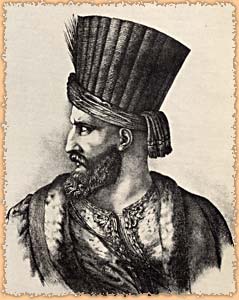Ostrobor IV, Neritsy Emperor
| Ostrobor IV | |
|---|---|
 | |
| Emperor in the North | |
| Reign | 1793–1816 |
| Election | 11 Petrial 1793 |
| Predecessor | Borovest III |
| Successor | Ostrobor V |
| Born | 9 Ediface 1776 |
| Died | Metrial 1816 |
| House | Neritsovid (Ratiborovid) |
Ostrobor IV Brityu (High Secote: Ostroborǔ 4 Brǐtjǔ) was Emperor in the North (i.e. Emperor of Azophin) from 1793 until his death in 1816. He was the first person to be recognised as holding that title, although in Azophine historiography he is the direct successor of the posthumously recognised Borovest III. An energetic character, he was able to exercise a great deal of direct power within government despite his ambiguous role vis-à-vis the Marshal and Plenipotentiary in the North, an achievement that would be unmatched by any successive Emperor until the Azophine Restoration in the early 20th century.
Ostrobor was the grandson of Borovest Neritsy (posthumously recognised as Borovest III in Azophine sources) via his son Yaromir Neritsy. He was thus a direct patrilineal descendant of Spytistan II. His family had been effectively kept as hostages of the Terophatic court since the Voivode coup of 1697 that brought Chistibor the Last to power, although by the time that Ostrobor himself was born, the conditions of this captivity had become far more comfortable than once they had been. He was raised in Axopol, where he acquired a marked southern accent and temperament as well as a love of elephant riding. Even his grandfather's growing celebrity in the north does not seem to have had much effect on this cosseted lifestyle until the War of the Third Emperor, when Boromir Alevy proclaimed that he was fighting on Borovest's behalf. This led to the entire family being arrested and internally exiled to the remote south of the country until the conclusion of the peace in 1791, when Krasimir II agreed in principle to recognise an Emperor in the North.
After Borovest himself died in the monsoon season of that year, there was some initial uncertainty over who should take his place in Inetsograd. But by late 1792, Krasimir and Alevy had agreed on Ostrobor's candidacy, despite his father's older brother – the expected priority heir – still being alive, a choice likely motivated by his youth and relative malleability. Ostrobor was thus plucked from his obscurity in the south and brought north. After entering Great Pestul to great fanfare, he was elected and acclaimed as Emperor on 11 Petrial 1793. Here he continued his education alongside a group of elite northerners including the future Universal Prophet Mezveim. In 1796, the ever-watchful Alevy decided that he would be better served by an Emperor far from the hurly-burly of aristocratic politics at Great Pestul, and Ostrobor was sent into de facto internal exile at Arogar. Here he dedicated himself to intellectual pursuits, and gradually began to surround himself with a coterie of prominent reformist Scholars. Many of these were Terophites by origin, including the famous Yorheprourkah ShelMekhdoum, closely identified with the ideas of the Neocracy.
Ostrobor's political position as Emperor were never entirely clear. Alevy's government maintained that his rights corresponded to those of the Terophatic Emperor under the Lethpol Covenant signed almost sixty years earlier – that all his day-to-day authority had been devolved to the Marshal. Whether this grant of authority could be revoked was an open question. Under Alevy, who was very personally popular, this was never very likely. But after his premature death in 1798 and the ascendancy of his far less popular brother Spytidar Alevy in the chaotic power struggle that followed, the Marshal found himself in dire need of new sources of legitimacy. In practice this meant relying more and more heavily on Ostrobor: having him issue Utterances and Edicts personally, launching an imperial tour of the Azophine territories, and ultimately inviting him to take up permanent residence in Great Pestul. This provided the Emperor with a great deal of leverage which he and his circle, and in particular ShelMekhdoum, made ready use of.
Nonetheless, although Ostrobor and his allies certainly enjoyed a great deal of influence and many of his favourites were appointed to significant offices under Spytidar, the extent to which he ruled rather than reigned has often been exaggerated because of the events of Purity 1811, when amid popular rioting in Great Pestul Ostrobor proclaimed that he was dismissing Spytidar and planning to rule alone (the so-called Interpellation or 'Holding to Account'). This attempt, although since mythologised, proved a disastrous failure: the aristocracy stood almost united against the government and refused to pay taxes. Ostrobor's embattled regime managed to survive nine months of growing resistance, but in 1812 he was forced to dismiss ShelMekhdoum and appoint Spytidar Mudovisky Marshal. For the rest of his reign he retired to Inetsograd.
An elephant-riding accident in 1815 left Ostrobor with what was most likely significant brain damage. He died six months later, and was succeeded by his nephew, Ostrobor V.